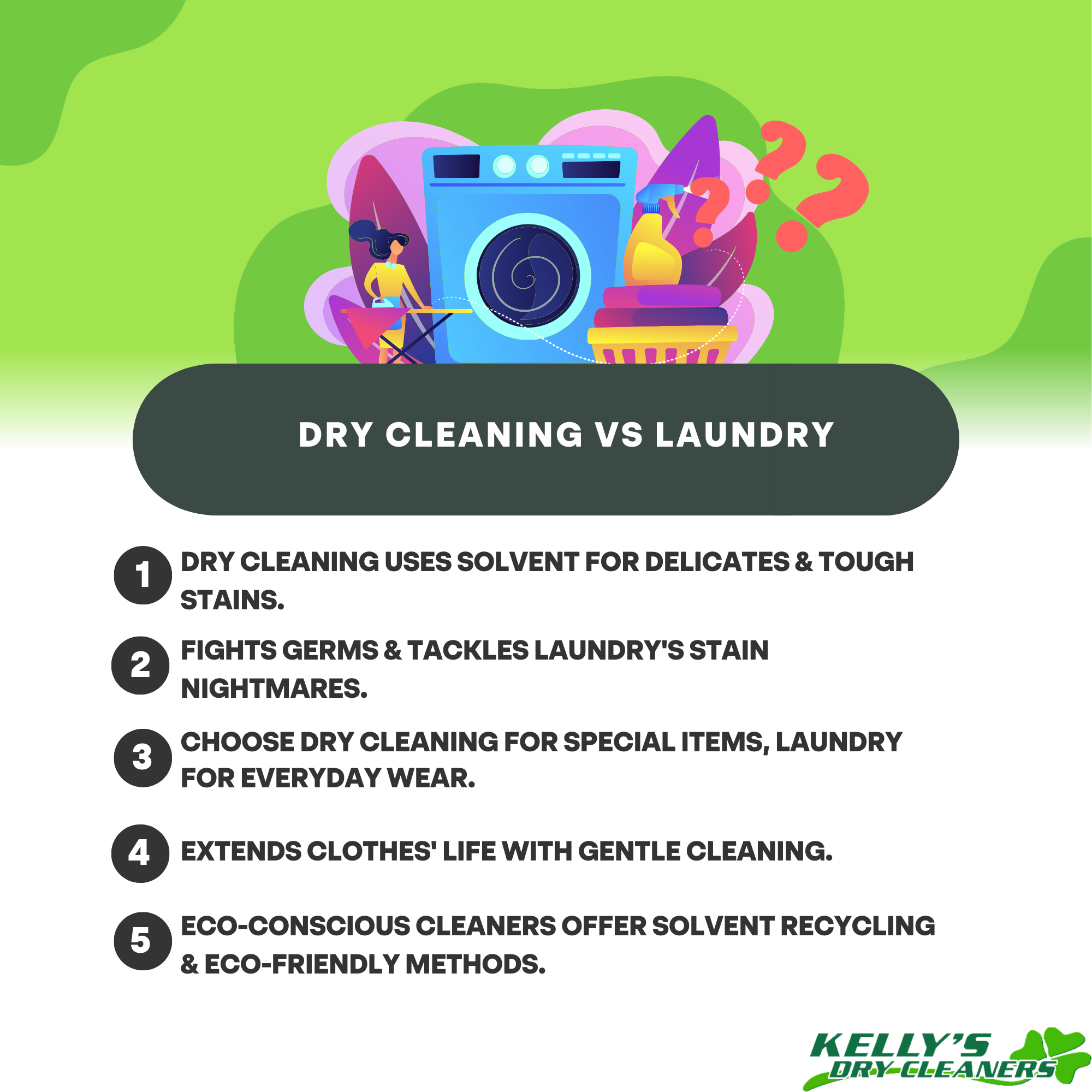Does Dry Cleaning Kill Germs and Stains?
When it comes to keeping your clothes looking sharp and feeling fresh, you might find yourself in a laundry battle: dry cleaning vs laundry; which is better? If you’ve ever questioned the purpose of dry cleaning when you have a perfectly functional washing machine at home, this article is for you.
Understanding the Deep Clean: Dry Cleaning vs Laundering
Firstly, let’s clear up a common misconception. Despite the name, dry cleaning isn’t actually a “dry” process in the traditional sense. It involves a fascinating technology that utilizes a liquid chemical solvent instead of water. Think of it as a deep clean for your clothes, where the solvent acts like a magnet, attracting and dissolving dirt, oils, and stains from the fabric’s fibers.
But do dry cleaners simply wash your clothes in this solvent? Not quite. Traditional laundering relies on agitation (the tumbling action of the washing machine) and detergent to loosen and lift dirt particles away from the fabric. Dry cleaning, on the other hand, uses a combination of solvent and gentle tumbling to loosen dirt, followed by a specialized extraction process to remove the solvent and the trapped impurities. Finally, the garment is finished with steaming or pressing to restore its shape and achieve that crisp, professional look.
Dry Cleaning’s Winning Formula: Germ-Fighting Power and Stain Removal
Now that we understand the mechanics, let’s delve into the key benefits of dry cleaning that set it apart from your home washing machine:
- Germ Warfare: One of the primary advantages of dry cleaning is its effectiveness in eliminating germs and bacteria. The solvents used in the process are powerful enough to neutralize a wide range of microorganisms, making it a particularly attractive option during flu season or when dealing with clothes that may have come into contact with allergies or illnesses.
- Stain Slayer: Stubborn stains like oil-based spills, paint, or even food coloring can be a nightmare to remove with regular laundry. Here’s where dry cleaning shines. The special solvents used in dry cleaning are specifically formulated to break down these tough stains, leaving your clothes spotless and looking their best.
Making the Right Choice: Dry Cleaning vs Laundry
Is dry cleaning better? The key to garment care isn’t about pitting dry cleaning against laundry but rather understanding when each method excels. Here’s a breakdown to help you decide:
Dry Cleaning Champions:
- Delicate Fabrics: Delicate fabrics like silk, wool, cashmere, and leather can be easily damaged by the agitation and heat of a washing machine. Dry cleaning provides a gentle yet effective clean that preserves the delicate nature of these materials.
- Complex Garments: Sequins, beads, and intricate tailoring require special care. Dry cleaning helps to maintain the structure and integrity of these embellished garments, preventing damage or snags.
- Stubborn Stains: As mentioned earlier, dry cleaning is the go-to solution for tackling those persistent stains that regular washing can’t handle.
Laundry Legends:
- Everyday Clothes: For your everyday cotton t-shirts, jeans, and workout clothes, regular laundering with detergent and water is perfectly sufficient. It’s a cost-effective and efficient way to keep these everyday essentials clean.
- Durable Fabrics: Sturdy fabrics like denim and cotton can withstand the harsher environment of a washing machine without any problems.
The Longevity Factor: Why Dry Cleaning Can Be Your Clothes’ Best Friend
Beyond stain removal and germ-fighting, dry cleaning offers another significant advantage: it’s often gentler on your clothes compared to regular washing. The reduced agitation and lack of harsh detergents help to minimize wear and tear, extending the lifespan of your garments. It is particularly crucial to pay attention to the care of delicate or costly clothing items.
Beyond the Basics: Advanced Dry Cleaning Options and Eco-Conscious Considerations
While traditional dry cleaning is a powerful tool for garment care, the industry offers a variety of specialized cleaning options to cater to even more specific needs. Here’s a glimpse into some advanced dry cleaning techniques:
- Wet Cleaning: This method utilizes a water-based solution but with much gentler chemicals and lower temperatures compared to traditional laundry. It’s ideal for garments with delicate embellishments or fabrics that might be sensitive to harsher solvents used in conventional dry cleaning.
- Leather and Suede Cleaning: Leather and suede require specialized cleaning techniques to maintain their suppleness and prevent cracking. Professional dry cleaners are experts in cleaning and maintaining leather and suede items. They have the necessary skills and equipment to keep your valuable possessions looking their best.
- Specialty Spot Removal: For particularly tricky stains like ink, blood, or wine, some dry cleaners offer specialty spot removal services. These involve targeted treatments with specific solvents or enzymes to remove the stain without damaging the surrounding fabric.
The Green Side of Clean: Eco-Friendly Dry Cleaning
As environmental consciousness grows, so do eco-friendly dry cleaning options. Here are some ways the industry is becoming more sustainable:
- Solvent Recycling: Many reputable dry cleaners utilize solvent recycling programs. This process allows them to reuse a significant portion of the cleaning solvent, minimizing waste and environmental impact.
- Silicone-Based Cleaning: A recent innovation is the use of silicone-based solvents in dry cleaning. These solvents are considered to be more environmentally friendly than traditional options, offering a comparable cleaning power without the harsh chemicals.
Making Informed Choices: Tips for Choosing a Dry Cleaner
With a variety of dry cleaners available, here are some helpful tips to find the one that best suits your needs:
- Reputation and Reviews: To find a reliable dry cleaner, it is recommended that you search for one with a good reputation and positive feedback from customers. Starting your search with online review platforms or recommendations from friends and family is an excellent idea.
- Service Offerings: Consider the types of services offered by the dry cleaner. Do they specialize in specific fabrics or cleaning methods that align with your wardrobe needs?
- Eco-Conscious Practices: If environmental responsibility is a priority for you, inquire about the dry cleaner’s solvent recycling practices or use of eco-friendly cleaning methods.
- Pricing and Transparency: Get clear pricing information upfront, and ensure the dry cleaner provides a detailed receipt outlining the cleaning methods used for your garments.
By following these tips and understanding the different strengths of dry cleaning and laundry, you can ensure your clothes receive the proper care they deserve, keeping them looking sharp, lasting longer, and remaining hygienically clean. So, the next time you’re faced with a laundry dilemma, remember – dry cleaning isn’t just about removing wrinkles; it’s a powerful tool for preserving the life and quality of your favorite garments.
The Final Verdict: A Winning Combination
So, do dry cleaners wash your clothes? Yes, but in a way that’s specifically designed to be more effective and gentler on certain fabrics and stains. Ultimately, the best approach to garment care is a two-pronged attack. Utilize the power of dry cleaning for those delicate items or stain emergencies, and rely on your trusty washing machine for your everyday laundry needs. By understanding the strengths of each method, you can ensure your clothes stay looking their best, lasting longer, and remaining hygienically clean.
In conclusion, both dry cleaning and laundry have their own merits. The decision should be based on the type of fabric, the nature of the stains, and personal preference.
If you’re looking for professional and reliable dry cleaning in Durango, CO, consider Kelly’s Dry Cleaners. We offer expert dry cleaning services designed to keep your clothes clean, fresh, and long-lasting.




